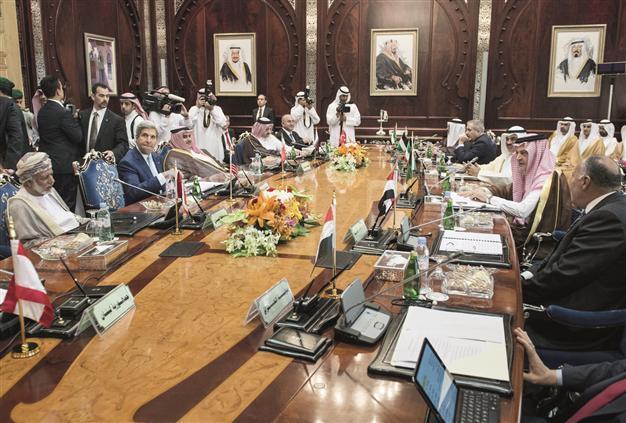Coalition meets after Obama’s anti-ISIL call
JEDDAH / WASHINGTON

US Secratery of State John Kerry (2L) and other atendees wait for the start of the meeting in Jeddah. AFP Photo
The coalition aiming to combat the Islamic State of Iraq and the Levant (ISIL) jihadists met Sept. 11 in the Saudi port city of Jeddah, following President Barack Obama’s authorization of U.S. airstrikes inside Syria for the first time, along with expanded strikes in Iraq.U.S. Secretary of State John Kerry and regional counterparts, including Turkey, discussed the details of supporting an American campaign against ISIL militants in Syria and Iraq.
In addition to Saudi Arabia, five other members of the Gulf Cooperation Council, Bahrain, Kuwait, Oman, Qatar and the United Arab Emirates, as well as Egypt, Iraq, Jordan and Lebanon, took part in the meeting, which was described by Kerry as “very important.”
Those at the meeting “discussed terrorism in the region, the extremist organizations behind it, and ways to combat it,” the official Saudi news agency SPA reported.
In a televised address late Sept. 10, President Barack Obama told Americans that he had authorized U.S. airstrikes for the first time in Syria and more attacks in Iraq in a broad escalation of a campaign against ISIL. Obama’s decision to launch attacks inside Syria, which is embroiled in a three-year civil war, marked a turnabout for the president, who shied away a year ago from airstrikes to punish Syrian President Bashar al-Assad for using chemical weapons against his own people.
In a widely anticipated, 13-minute White House speech, Obama said he would hunt down ISIL militants “wherever they are” in a drive to degrade and ultimately destroy the group, which has seized broad stretches of Iraq and Syria.
“That means I will not hesitate to take action against ISIL in Syria, as well as Iraq. This is a core principle of my presidency: If you threaten America, you will find no safe haven,” he said, speaking on the eve of the 13th anniversary of the Sept. 11, 2001 attacks.
Obama also asked Congress to authorize $500 million to train and arm “moderate” Syrian rebels. The training would take place in Saudi Arabia.
The U.S. military has launched more than 150 airstrikes in Iraq over the past month to halt ISIL advances. The new target list will include ISIL’s “leadership, logistical and operational capability,” as well as an attempt to “deny it sanctuary and resources to plan, prepare and execute attacks,” the White House said. U.S. officials have warned it will take years to destroy ISIL, with Obama telling Americans: “It will take time to eradicate a cancer like ISIL,” the White House said.
The U.S. president will also send 475 more American advisers to help Iraqi forces, which will bring to 1,600 the number there. Obama, determined to avoid a repeat of the Iraq war, stressed they would not engage in combat. The president laid out his emerging plan for tackling the group two weeks after coming under fire for saying: “We don’t have a strategy yet” for the group in Syria and six months after declaring that groups like ISIL were minor players.
In a significant move that could help rally Gulf Arab states behind the U.S.-led coalition, key ally Saudi Arabia will host inside its territory a U.S. training effort for Syrian rebels, senior U.S. officials said. The effort is dependent on the U.S. Congress approving the $500 million for the rebels. Congress is to consider the measure next week before lawmakers adjourn to campaign for Nov. 4 elections. The funding request generally has broad support.
A Syrian government minister, meanwhile, said any foreign intervention in Syria would be an “act of aggression” unless it is approved by Damascus. “Any action of any type without the approval of Syrian government is an aggression against Syria,” Ali Haidar, Minister of National Reconciliation Affairs, told reporters in Damascus.
Syria’s opposition welcomed Obama’s strategy, but urged Washington to take action against President Bashar al-Assad as well as jihadists. The U.S. announcement was praised by Baghdad, where a unity government was formed this week to address grievances that contributed to the rise of the jihadists.
But Russia said unilateral action would be a blatant violation of international law. “In the absence of an appropriate decision of the U.N. Security Council, such a step would become an act of aggression, a crude violation of the norms of international law,” said Russian Foreign Ministry spokesman Alexander Lukashevich.
















